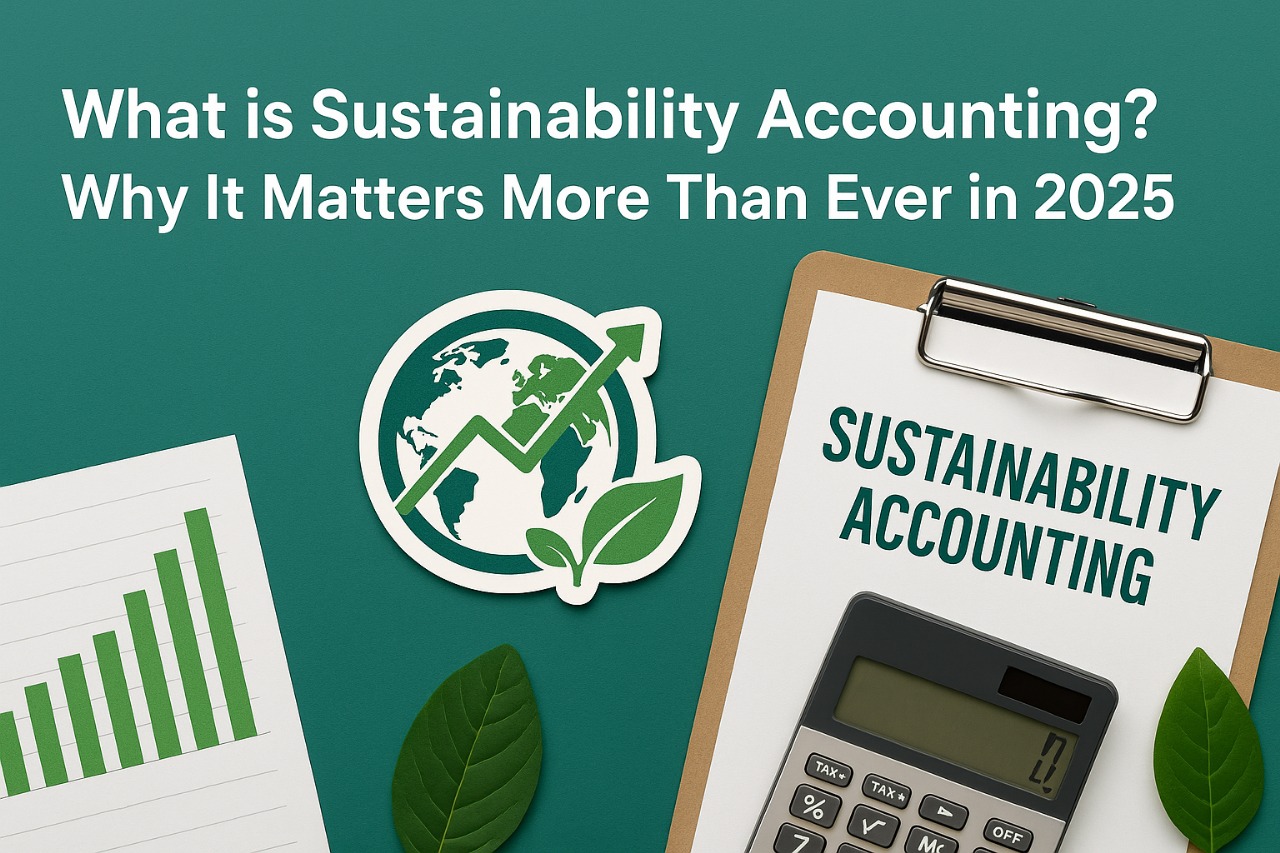
Blog
What is Sustainability Accounting? Why It Matters More Than Ever in 2025

In today’s business world, sustainability is no longer a buzzword; it’s a necessity. Organizations across the globe are being held accountable not just for financial performance, but also for their environmental and social impact. This is where sustainability accounting comes into play. It helps companies measure, manage, and report on their non-financial performance, something investors and stakeholders are increasingly demanding.
With global regulations tightening and ESG becoming a boardroom priority, there’s a growing need for professionals skilled in sustainability and non-financial reporting. At Fintelligent, we’re gearing up to launch a comprehensive FSA (Fundamentals of Sustainability Accounting) course to prepare the next generation of ESG-savvy accountants.
Let’s explore why now is the perfect time to understand sustainability accounting and how this emerging field is reshaping the future of finance.
What is Sustainability Accounting?
Sustainability accounting is the process of tracking, analyzing, and reporting a company’s environmental, social, and governance (ESG) performance. Unlike traditional accounting which focuses solely on financial metrics, sustainability accounting expands the lens to include non-financial data that reflects long-term business impact.
In India and globally, this field is becoming increasingly important. Investors, regulators, and even consumers want more transparency and accountability from the companies they support. This makes sustainability accounting in India an especially timely and strategic career path.
From Environmental Accounting to ESG Metrics
Environmental Accounting: Measuring the Real Impact
Environmental accounting is a crucial branch of sustainability accounting. It focuses on quantifying the environmental costs associated with business activities—like energy usage, waste generation, and water consumption. It’s the foundation of understanding a company’s ecological footprint.
Carbon Accounting: Tracking Emissions Accurately
As the world moves toward carbon neutrality, carbon accounting has become vital. It measures greenhouse gas emissions across operations and supply chains, enabling businesses to meet climate targets and comply with global standards.
Green Accounting: A Broader Perspective
Green accounting goes even further by incorporating environmental assets and liabilities into financial statements. It’s an emerging field gaining attention as stakeholders seek more comprehensive views of corporate sustainability.
Sustainability Reporting: The Bridge Between Data and Disclosure
Once organizations collect sustainability data, they must communicate it effectively through sustainability reporting. This process involves disclosing ESG performance to stakeholders, often through integrated reports.
Stakeholders no longer just care about profits—they care about purpose. Non-financial reporting helps build transparency, trust, and long-term value.
Standards and Frameworks: Navigating the Reporting Landscape
SASB Standards: Practical Guidance for Industries
The Sustainability Accounting Standards Board (SASB) offers industry-specific standards that help organizations report on the ESG factors most relevant to their business.
CSR Reporting: Where Compliance Meets Communication
CSR reporting (Corporate Social Responsibility) often overlaps with sustainability accounting, especially in India where businesses are required to disclose CSR activities under the Companies Act.
Triple Bottom Line Accounting: People, Planet, Profit
Triple bottom line accounting is a key concept that evaluates success through three lenses: economic, environmental, and social. It ensures that companies think beyond profits when assessing performance.
ESG Metrics Integration: Making Sustainability Part of the System
To be truly effective, sustainability data must be integrated into financial systems. ESG metrics integration allows companies to link sustainability goals with business strategy, risk management, and investment decisions.
By embedding ESG into core accounting practices, companies can future-proof their operations and attract conscious capital.
Why Sustainability Accounting is the Future Especially in India
India is at a pivotal moment in its sustainability journey. With new mandates from SEBI, growing investor pressure, and increased public awareness, demand for ESG professionals is surging. This is where Fintelligent’s upcoming FSA course can give learners a competitive edge.
Whether you’re an accounting student, finance professional, or ESG enthusiast, understanding sustainability accounting in India can open doors to high-growth careers in consulting, corporate strategy, and investment analysis.
Ready to Lead the Future of Finance?
Stay ahead of the curve with Fintelligent’s soon-to-launch Fundamentals of Sustainability Accounting (FSA) course. Learn the skills that top employers are demanding from ESG reporting to carbon accounting and SASB standards, and become part of the sustainability revolution.
FAQs About Sustainability Accounting
Q1. What is the difference between sustainability accounting and environmental accounting?
A. Sustainability accounting includes environmental, social, and governance (ESG) factors, while environmental accounting focuses solely on ecological impacts like emissions and resource use.
Q2. Is sustainability accounting important in India?
A. Yes. With increasing regulatory focus and stakeholder expectations, India is rapidly adopting sustainability practices, making it a growing career field.
Q3. What is carbon accounting used for?
A. Carbon accounting helps companies measure and manage their greenhouse gas emissions, ensuring compliance with climate regulations and sustainability goals.
Q4. What are SASB Standards?
A. SASB provides industry-specific guidelines for disclosing material ESG information, helping companies align sustainability with financial performance.
Q5. Is Fintelligent offering a course in sustainability accounting?
A. Fintelligent will soon launch a comprehensive FSA course tailored for professionals looking to build expertise in sustainability accounting and ESG reporting.
